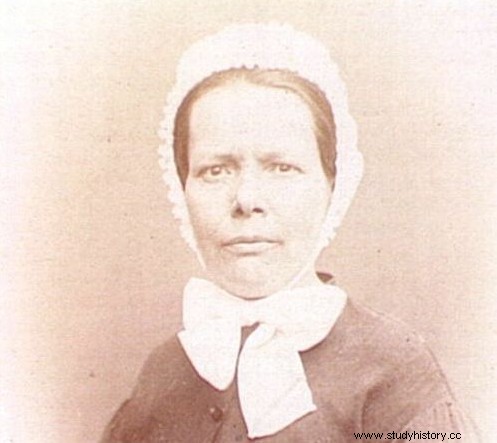Nathalie Duval became Lemel (1827 – 1921), was an anarchist and feminist activist. She notably participated in the Paris Commune of 1871 and was deported to New Caledonia with Louise Michel.
The International Association of Workers
 Nathalie Duval was born on August 26, 1827 in Brest, where her parents ran a café. She was educated until the age of twelve and then became a worker in the field of bookbinding. In 1845, at age 18, she married Jérôme Lemel, her colleague who was eight years older than her; they will have three children. Four years later, the Lemels moved to Quimper and opened a bookstore-binding shop, but they went bankrupt in 1861 and had to leave to find work in Paris.
Nathalie Duval was born on August 26, 1827 in Brest, where her parents ran a café. She was educated until the age of twelve and then became a worker in the field of bookbinding. In 1845, at age 18, she married Jérôme Lemel, her colleague who was eight years older than her; they will have three children. Four years later, the Lemels moved to Quimper and opened a bookstore-binding shop, but they went bankrupt in 1861 and had to leave to find work in Paris.
In the capital, Nathalie continues to work in bookbinding, joins a union and becomes a socialist activist. The year 1864 saw the birth of the International Association of Workers, or First International, in London, and Nathalie joined it the following year. When a strike broke out, she got involved, got herself elected as a shop steward and sat on the strike committee. Noted for her determination, she notably demands equal pay for women and men.
The Paris Commune
In 1868, because of Jérôme's alcoholism, Nathalie Lemel left the marital home and became even more involved in activism. With a few colleagues, she created a food cooperative and a workers' restaurant, where she helped prepare meals.
March 1871 saw the outbreak of the Paris Commune. Very active in women's movements, Nathalie created the Women's Union in April with Elisabeth Dmitrieff; it is one of the first movements to claim feminism and to claim the right to vote and equal pay. On May 21, 1871, Versailles troops entered the city and Nathalie participated in the fighting and caring for the wounded on the barricades, until the defeat on May 28.
Arrested, Nathalie was sentenced to deportation to New Caledonia and embarked with the activist Louise Michel, over whom she would have a real political influence. In 1880, the amnesty law allowed them to return to mainland France; Nathalie finds a job there at the newspaper L'Instransigeant and continues to campaign for women's rights.
Nathalie Lemel died in poverty in 1921 in Ivre-sur-Seine.
